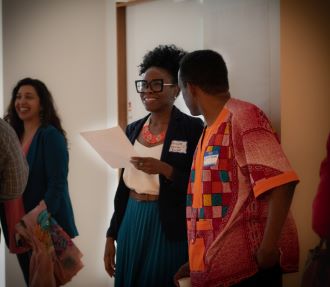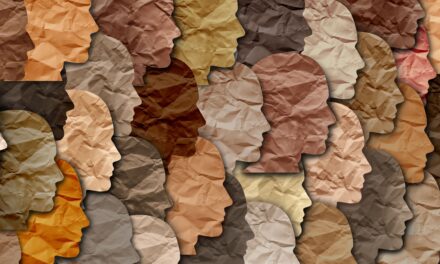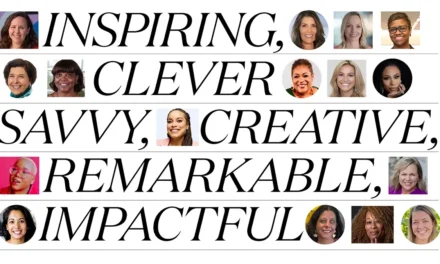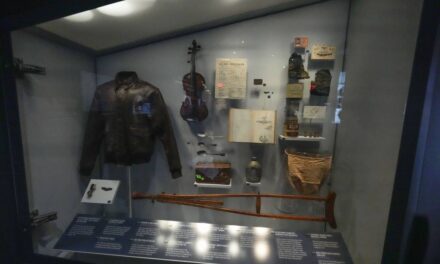During the restless summer of 2020, when a deadly virus threw the world off course and the nation’s streets filled with citizens angered by a corrupt and racist justice system, Derrick Tarver found himself taking long walks and thinking, That could have been me.
Tarver, a Black man, is an engineer by training who spent 30 years working in corporate America, and a real estate investor who helps provide housing for at-risk youth. But he feared the color of his skin would be the only thing law enforcement officers would notice in an encounter.
That anxiety was echoed by Black and brown youth Tarver talked to. Asked to describe themselves and their futures, many young people said they felt invisible. Silenced. Fearful.
That’s why he launched the That Could Be Me Foundation and began working on a multi-faceted app aimed to help young people find their future paths and realize their value. The TCBM app offers seven technologies that invite collaboration and personal expression, including story-telling, anime creation and AI development.
“They can express what they’re feeling but also use the tools to creatively define their future,” Tarver says. “This is their opportunity to tell their own stories on their own terms. We want them to discover their potential and create their purpose.”
The name is an attempt to take the defeatist statement that wouldn’t leave his head and give it a “positive aspirational twist.”
“Instead of That could have been me, it becomes That could be me,” Tarver says, “thriving, loving myself, getting my degree, unleashing my potential, finding my purpose, cleaning my block, lifting as I climb. It’s a reminder to keep the glass half full and to realize that could be any pursuit that improves our well-being or the communities we live in.”
“One of the biggest barriers to Black women seeking help is not feeling safe. The first thing that comes to mind when people think of an auntie is safe.” — 2021 Winner Nicole Kenney
Tarver’s project is one of six finalists competing for the $50,000 grand prize in the Well City 2023 Challenge: Community Solutions for Heart and Mind Health, a contest presented by Economy League of Greater Philadelphia and Accelerate Health Equity with funding from Independence Blue Cross.
Other finalists include a wellness center for a holistic approach to pediatric medicine; an app that brings “wellness into night life;” and a “Wellness Co-op.” (A complete list of finalists and further information about each appears at the end of this article.)
The grand prize winner will be announced during a community showcase on September 26 at Independence Blue Cross HQ, 1901 Market Street. The event, free to the public, will include conversations with each team about their projects and ideas as to how to make Philadelphia a healthier place for all. To attend, register here.
“Philadelphia obviously has an incredible healthcare marketplace with world-class hospitals the likes of which you won’t find anywhere, incredible resources, a competitive healthcare market,” says Elissa Klinger, director of Health Equity at the University of Pennsylvania’s Center for Digital Health. “And yet we have a population that has some of the lowest health outcomes in the state and the country.”
This is the third entrepreneurial challenge offered by the Economy League — and the second in the Well City format. Economy League Executive Director Jeff Hornstein says the initial idea was to address “the city’s lack of civic innovation.” Working to balance inequities, Hornstein says, is not just a moral cause.
“The future of capitalism in this country depends on promoting [majority minority] cities,” he says. “If you care about capitalism, regardless of how you think about race, we need to spark entrepreneurship.”
Solving for the barriers to healthcare
The Well City challenge, Klinger says, is a way to help understand the barriers to care, where health systems are failing people, and what community-based solutions might bridge the gap.
More than 100 teams originally entered the competition with projects aimed at addressing local mental or heart health issues. In May, 15 of those teams were invited to make Shark Tank-style pitches to a judging panel, which awarded three teams $10,000 and the opportunity to compete in the finals. Another three teams became finalists after winning the People’s Choice Awards and grants of $7,500 each.
Ngozi Onuoha’s Health4Naija is one of the finalists. A primary care physician who is also certified in geriatric medicine, Onuoha launched her health education start-up in 2016 to provide health education to Nigerians and people from the diaspora. One of its primary goals: stop heart disease before it starts by educating teens about contributing factors and emphasizing healthy eating and cooking. Heart disease is the #1 killer of Philadelphia adults.
“Hermitage means a place of refuge. When you support caretakers in really meaningful ways, it helps alleviate stress and addresses burnout.” — Lois Volta
“We know the build-up of fat in blood cells begins in childhood and, if unchecked, accumulates as people get older. We want to prevent heart disease by preventing one of the major risks before the risk begins,” Onuoha says. “It’s not just education. It’s showing people how to prepare quick nutritious meals and introducing them to foods they’re not familiar with.”
Onuoha is using her $10,000 finalist grant to pilot a cooking workshop in November. These workshops will also be filmed and uploaded to YouTube. The hope is that the educated young people will take what they’ve learned into their home kitchens.
“The adults will learn from the teens,” she says. “The people who pick up fast food don’t know how to cook. It’s just as easy to prepare a delicious meal in 30 minutes and then have food for the whole week.”
Care for the caregivers
Another project in the running for the grand prize is The Hermitage Philadelphia. It takes its name from the centuries–old city-owned building in Fairmount Park that the project’s creators hope to repair and open as a sanctuary for community mental health professionals.
“The rates of burnout for (these) professionals right now are out of control,” says Lois Volta, one of the project’s leaders. “We need to have systems in place to take care of the caregivers.”
She imagines The Hermitage as a place where visitors can enjoy nature walks, work in the community garden, enjoy home-cooked meals, book a massage or reiki treatment, or take a yoga class. It will also have overnight rooms.
“Hermitage means a place of refuge,” Volta says. “When you support caretakers in really meaningful ways, it helps alleviate stress and addresses burnout.”
The Hermitage is a non-profit with the support of organizations including The Fairmount Park Conservancy and Philadelphia City Council. The organization now needs to raise $2 million to make the building usable.
“We have a model and business plan that’s easily scalable and can be replicated elsewhere for other caretaking professions like teachers or social workers,” Volta says.
Since the six finalists were named in May, they’ve worked with a social impact accelerator program to further hone and test their ideas. Volta says that support has helped create a website and pitch deck for the organization. “It’s helped us get all of our ducks in a row,” Volta says.
Hornstein says it’s likely all of the finalists, not just the grand prize winner, will receive some forms of ongoing assistance.
“All of the projects are really strong,” Hornstein says. “We want to make sure they get some traction.”
Aunties to the rescue
Some groups that enter the challenge have programs already in place. Others come with ideas that have potential. The latter was the case for Nicole Kenney, whose app Hey Auntie was awarded $50,000 as the winner of the 2021 Well City Challenge.
The technology platform seeks to connect Black women across “ages and life stages” to listen, give advice, share stories, and build community. A strong support system has been shown to improve the health and well-being of Black women, Kenney says.

Kenney developed the idea a few years ago when dealing with her own feelings of burnout and depression. When a doctor said her physical illnesses were tied to her mental state, she balked.
“I’d never heard of stress making someone physically sick,” says Kenney, who has been profiled in Fortune and in November presented a TEDx talk titled, Hey Auntie!: How Aunties Changed my Life. “Then I talked to my auntie. I did more research and found Black women experience stress uniquely because of their race and gender.”
The name comes not from simple biology, but also the Black community’s cultural legacy of the “auntie”, Kenney says. In West African culture, an auntie is someone who says, “every woman’s child is my child, and I can look after another child and be just as invested in their future.” Aunties are generally older women with more life experience, but not always.
“I want to help women see themselves as aunties, with something to offer and to learn and teach,” she says. “One of the biggest barriers to Black women seeking help is not feeling safe. The first thing that comes to mind when people think of an auntie is safe.”
Kenney’s wellness tech platform isn’t finalized, but some programs are already up and running, including a speaker series called The Porch and an “auntie/auntee” mentoring program. “Hey Auntie” has about 800 current members and is growing steadily, Kenney says, with even physicians recommending the program. Many recent members tell her that they heard about “Hey Auntie” through a friend.
“That’s the highest endorsement of trust, someone saying, You need to join this community,” Kenney says. “We have women who are making meaningful connections and forming relationships and providing each other real support. That’s what makes them sustainable.”
The 2023 Well City Challenge finalists:
-
-
- Peds 360+, which expands pediatric medicine by providing full family-centered care.
- TCBME (That Could Be Me), a “behavioral health counseling ecosystem for minority teenagers.
- The Wellness Co-Op, a project for wellness providers who want to give residents consistent access to quality health care and resources at local public spaces.
- Heart Healthy Philadelphia, which provides healthy eating education and lessons to stop heart disease before it starts.
- EPIC life/ Nightlife to Whole Life, which aims “to help the nightlife community create a healthy and safe life balance through the use of our online engagement platform.”
- The Hermitage Philadelphia, a center where burnt-out mental health professionals can take a much-needed break.
-
![]() MORE ON HEALTH AND WELLNESS FROM THE CITIZEN
MORE ON HEALTH AND WELLNESS FROM THE CITIZEN
The Well City Challenge team and finalists. Left to right, Maritza Pedlar of ELGP, Joy Ballard of Wellness Co-op, Derrick Tarver of TCBME, Dr. Nichelle Adegbite-Maraventano, MD PEDS 360+; Erica Dixon AHE; and Kernika Gupta, IBX.




